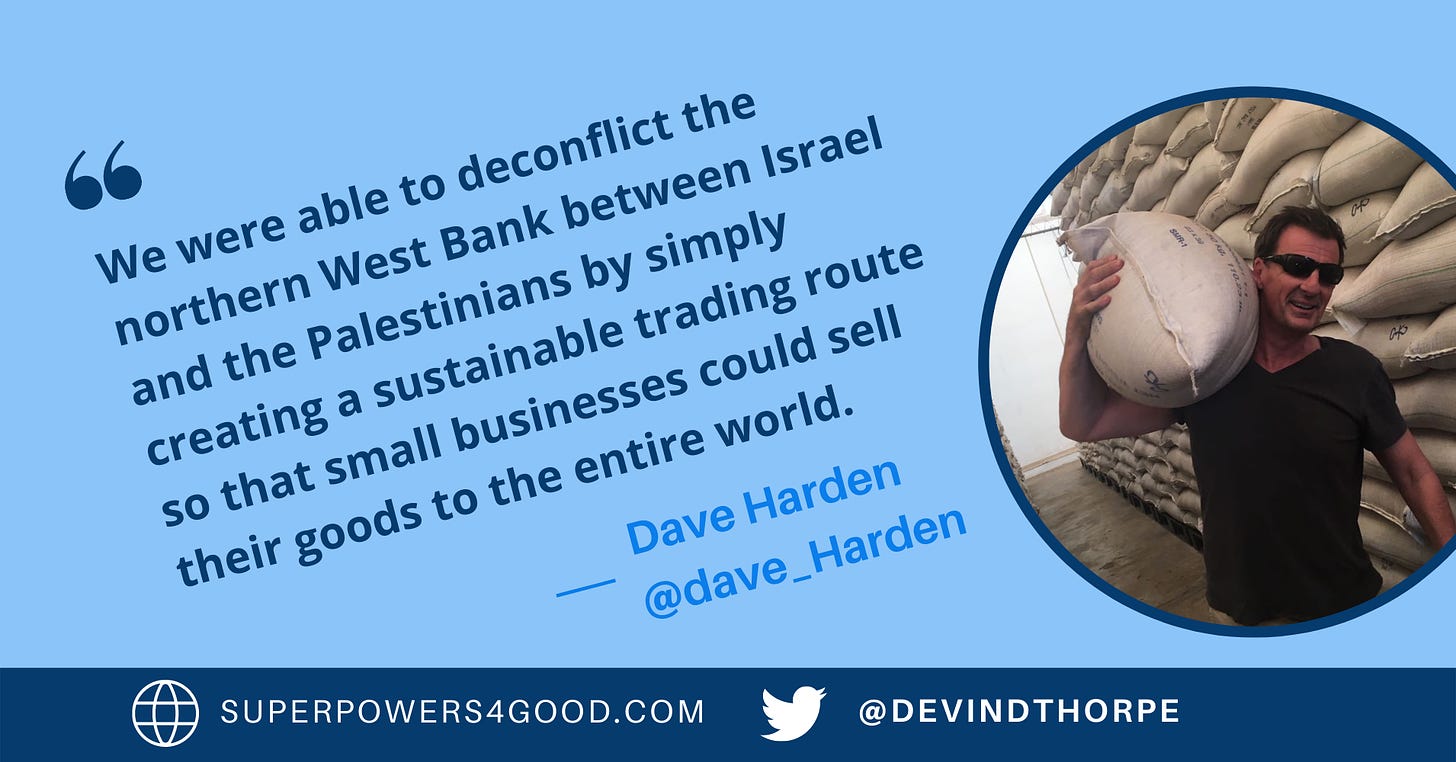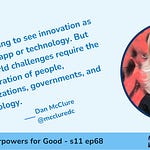Devin: Dave, what is your superpower?
Dave: I spent 30 years working with forgotten communities around the world where economic grievances drove political conflict. What I learned is that you have to listen to the local people, that if you don’t include the local people, you can’t accomplish anything. For instance, climate change or the pollution within the Chesapeake Bay or questions of overfishing, all of that surround my district, and we have spent billions and billions of dollars trying to clean up the Chesapeake Bay from a top-down approach for the last 50 years without success because we failed to include the local people. We failed to include the watermen. So just like you cannot save natural resources or create opportunity in a game park in Kenya if you exclude the villagers. Just like you can create, or you can accelerate war in West Africa with diamonds, blood diamonds, if you exclude the locals. In America, in my district, in Maryland and around the country, we must listen more closely to the hopes and dreams and aspirations and the concerns of local people if we hope to get beyond where we are in America today. So what I have learned being both rural and from this area and then being blessed to represent America around the world for practically 30 years, what I have learned a superpower, if you will, is that understanding local people is key to driving outcomes for a better future for our country and for the world.
Dave Harden spent 30 years working around the world to solve local problems. Along the way, he learned one fundamental truth: leaders must understand and engage with the people they hope to lead to create successful solutions to their problems.
Most of Dave’s time spent working abroad was done while working for the U.S. Agency for International Development (USAID). After serving decades there in the foreign service, President Obama appointed Dave as the Assistant Administrator for the U.S. Agency for International Development’s (USAID) Bureau for Democracy, Conflict, and Humanitarian Assistance.
The appointment required U.S. Senate confirmation, which he received without a negative vote.
After President Obama’s term, Dave returned to the foreign service in USAID. President Trump then gave him the Presidential Award for Distinguished Service, the highest award in the Foreign Service, for “sustained extraordinary accomplishment in the conduct of the foreign policy.”
After leaving USAID, he founded the Georgetown Strategy Group to engage in solving the same international challenges, leveraging private talent and capital. “We look at crises and trends in the world ahead, and we try to align capital, talent and technology to blunt those challenges that we will see that are coming down the road 10, 20 years down the road,” Dave says.
At the Georgetown Strategy Group, he partners with MIT. “We developed a system that is an early warning system for long-range climate impact,” he says. At USAID, Dave had employed an early warning system to predict six to nine months ahead of a famine that one was developing, allowing the agency to deliver aid when it was needed. Mimicking that concept, with MIT, he’s designed a model to identify where climate change will have the most significant impact 10 to 20 years out.
That long-range foresight will allow his firm and others to help communities plan and prepare for climate impacts that would otherwise devastate communities and their economies.
Another example of his work at the firm includes an effort to turn around a struggling Palestinian startup. Hired by the investors, including some Israeli investors, he and his team worked to turn around the Ramallah-based enterprise. Ultimately, the effort was done in by the pandemic.
One of the notable experiences in his career was in Libya, reopening diplomatic operations and efforts to stabilize the country and its economy after the tragic death of Ambassador Chris Stevens. He shared the story:
It was dangerous. And I mean, full stop. It was dangerous. I flew in with Gene Cretz, who was the ambassador at the time, and we went in with a very big security detail. Libya was still very much in the middle of its civil war. Gadhafi was still in power, but he had left Tripoli and the militias had taken over. This was in 2011, in September of 2011, and so we arrived on the ground. It was extraordinarily dangerous. The State Department doesn't have the appetite for these things anymore after Chris Stevens, who was a friend and a colleague, was killed in in Libya.
We came in and my job was basically to kind of restart both the economy, the governing systems and to blunt the humanitarian crisis. And what I was most proud about is, normally in these kinds of crises, America wants to be seen as doing something. And so we bring in the Mercy ship or we fly in C-130 full of beds. And, in many ways, it never works. It just is more of a symbol than a solution. But what I was able to do is to draw down Libyan money that was held in escrow and in the New York Federal Reserve and use that to jumpstart the private sector, both equipment manufacturers and suppliers, and repair folks and the pharmaceuticals to come in and immediately restart the health care system. And it didn't cost the American taxpayers anything. We used Libyan money and we use the private sector, and we were able to turn around impact very, very quickly.
Dave also has experience in Afghanistan and has watched recent events with dismay. he describes the pullout as “chaotic” and “suboptimal.” “The exit was terrible,” he says, noting that he would have left a small contingent there.
With the decision made and executed, the situation is terrible, primarily financial, with devastating human impact. The banking system and currency are collapsing, yielding spiraling hyperinflation. The economic collapse is leading to profound humanitarian crises.
Dave has a plan modeled, in part, on his experience in Libya. “What I would do is take some of the funds that the U.S. has control of in of Afghan reserve currencies that are in New York put it into a trust fund that would be administered that would allow the private sector to trade and to build up food stocks while the U.N. continues to provide assistance to the very most vulnerable.”
Now, he is running for Congress in Maryland’s 1st Congressional District.
In all his work, he leverages a lesson he now considers his superpower: understanding and engaging with the local people he serves.
How to Develop Understanding Local People As a Superpower
Understanding and engaging with local people, the people you hope to lead or serve, is a skill you can develop regardless of your aptitude. And Dave ties the skill directly to success.
He points out that for 50 years, governments and NGOs have spent billions of dollars trying to clean up the Chesapeake Bay without success. “We’ve bought process. But at the end of the day, you’re not buying results.”
He says the same thing has happened in Afghanistan, where “we did not buy results. We bought process.”
“Including the local people, making sure we’re being very rigorous about what results are, making sure that those results are clear, crisp and achievable. And then driving towards that is going to be the outcome now,” Dave says, of applying his approach.
“That drive for results over politics or process has got to be how we think about the next decade,” he says.
He offered this example of success working with local people in the Middle East:
We were able to deconflict the northern West Bank between Israel and the Palestinians by simply creating a sustainable trading route so that small businesses could sell their goods to the entire world.
It lowered unemployment, improved governance; it created jobs. It created private capital that could be reinvested in other productive businesses and lowered the risk that militias would be disruptive. We bought essentially calm and stability in the northern West Bank for a decade.
Developing this skill requires engaging actively with the people you serve, listening effectively and working to fully understand their perspective before you implement an attempt at solutions. This process will yield organic, natural support when you are on the right path.
You can make understanding local people a superpower that will enable your impactful success.
























Understanding and Engaging Local People Is Key to Success in Government